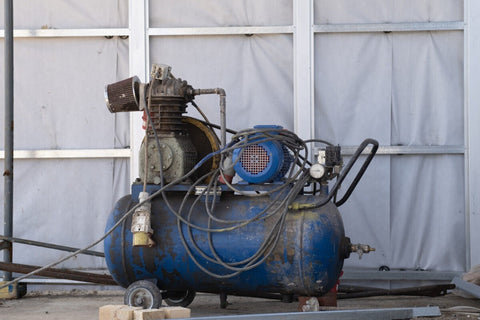Jump To:
There is incredible value in understanding the basics of how our everyday equipment works, especially for complex machines like air compressors. The more you know about your machine, the better you’re able to troubleshoot when something goes wrong. But what do you do when your air compressor is not turning on?
At face value, this problem may seem straightforward – if the machine doesn’t turn on, then it’s broken. However, the truth is that several factors can contribute to an air compressor refusing to start. The issue could be due to a faulty pressure switch, electrical disturbance, or even a lack of regular maintenance.
Having a malfunctioning air compressor can be a significant inconvenience, interrupting your activities or even bringing your entire operation to a halt. That’s why it’s worth taking a deeper look into why your air compressor might not be turning on and how to fix these issues.
5 Common Reasons Why Your Air Compressor Is Not Turning On
Knowing the reasons behind your air compressor not turning on is the first step toward addressing this issue. Here are some of the most common causes of an air compressor refusing to crank up.
Faulty Pressure Switch
The Issue: The key role of the pressure switch in an air compressor is essentially to tell the system to start and stop. When your compressor doesn’t kick on, one common culprit might be a faulty pressure switch. For instance, if the pressure switch is stuck in the open position, it may not send the necessary signal to the compressor, preventing it from working as expected.
The Solution: If the pressure switch is at fault, in many cases, the best solution is to replace it. Always make sure to replace the faulty pressure switch with one that matches the specifications of your compressor. Consult your owner’s manual or the manufacturer’s website to find the correct part.
Electrical Issues
The Issue: Electrical problems are one of the most common causes of air compressor failures. From a blown fuse to issues in the engine compartment, several electrical components could prevent your compressor from turning on. Always ensure that your compressor has power. If it doesn’t, the problem might lie within the power supply, wiring, or a fused connection needing replacement.
The Solution: If you suspect an electrical issue, the first step is to click the reset switch. If you find a blown fuse, replacing it may bring your air compressor back to life. However, remember that a repeated blown fuse indicates a bigger electrical problem. Consider consulting with an experienced professional who can rectify any underlying issues that are causing this experience.
Lack of Regular Maintenance
The Issue: Regular maintenance is crucial for keeping your air compressor in top condition. Not having routine maintenance leaves your compressor susceptible to various issues, including motor failure or low pressure. Regular checks and servicing can prevent unexpected breakdowns, prolong the life of your compressor, and maintain its efficiency.
The Solution: The simplest yet crucial action is performing regular maintenance on your compressor. From changing filters and oil to checking hoses and belts for wear and tear, a little care goes a long way to prevent unforeseen issues.
Defective Electric Motor
The Issue: If you notice a humming sound or excessive noise when trying to start your air compressor, it might be an indication of a failing electric motor. Additionally, an overheated or burnt motor due to excessive usage or lack of maintenance can also stop your air compressor from turning on.
The Solution: A defective air compressor motor usually needs to be rewound or replaced, which should be done by a professional. A regular check-up of the motor and immediate action at the first sign of trouble can prevent extensive damage and costly repairs.
Low Pressure
The Issue: The air compressor requires a specific pressure level to kick-start its operations. If you notice that your compressor assembly is not reaching the correct pressure level, the low-pressure switch may be the source of the problem. In this case, you might need to adjust or replace the pressure switch. Alternatively, there could be a mechanical failure involving a check valve, which can cause the compressor to trip under excessive load. In certain rotary screw compressor cases, there may be an anti-start switch that activates if too much pressure is sensed.
The Solution: Manually reset the low-pressure switch to tackle low-pressure problems. If resetting doesn’t work, replacing the switch is the best course of action. Remember to replace it with a switch that matches your air compressor’s specifications.
Understanding and solving these issues will not only ensure the smooth running of your compressor, but will also extend its life, efficiency, and productivity.
When to Repair Your Air Compressor & When to Replace It
Sometimes, despite our best efforts and intentions, an air compressor might just refuse to work, leaving us with the critical decision of whether to repair or replace it. It can be a tough call to make. Here are some guidelines to assist you in making an informed decision.
Consider the Lifespan
A well-cared-for compressor can serve you well for about 10-15 years, given it operates under normal conditions and is regularly maintained. However, if your device is nearing the end of this period and frequently causing you trouble, it might be time to consider replacing it.
Severity of the Issue
If the problem is minor, such as a blown fuse, electrical wiring problems, or insufficient air pressure, it is certainly reasonable to fix it. These fixes are relatively inexpensive and do not take a lot of time. You can do these repairs yourself after a quick search online for your particular model’s wiring diagram.
However, some problems can be more severe, like a broken air suspension or a faulty compressor motor. When these occur, repairing the compressor might pose a significant challenge and can become an expensive affair. For instance, if the compressor motor is to be replaced, it could cost almost as much as a brand-new unit. In such cases, it might be more cost-effective to replace your machine entirely.
Downtime
If your business or operations depend heavily on the compressor and you can’t afford the time it takes for a lengthy repair, replacing the air compressor might be the most effective route to take.
Energy Efficiency
Older models tend to be less energy-efficient and can lead to high electricity bills over time. Newer models, on the other hand, run more efficiently and provide long-term cost savings.
Consider all these factors while making your decision. Still, remember that it’s equally important to consult with experts when you are unsure of the best approach to take.
Recognizing the Need for Regular Maintenance
The ability to troubleshoot and address your air compressor issues when they arise can save you time, money, and frustration. This blog has shed light on the common reasons your air compressor might refuse to turn on and provided practical solutions for each of these issues.
However, one key takeaway is the importance of regular maintenance. Neglecting routine maintenance exposes your compressor to various problems that can disrupt your activities and even halt your operations. Although you can diagnose and fix your air compressor problems yourself, the smartest and safest option is to have regular checks and servicing by industry professionals. At Advanced Air & Vacuum, we are committed to providing comprehensive services, including repairs, maintenance, and installations, ensuring your air compressor performs optimally, efficiently, and safely. We also offer air compressor parts like oil, filters, dryers, and piping, and we offer support and instruction for those who are eager enough to handle them on their own.
If you are experiencing issues with your air compressor that we have not covered in this article, please make sure to refer to our previous blog posts where we provided more detailed information on various problems frequently encountered with air compressors. Whether you are seeing a common problem or something more unusual, contact Advanced Air & Vacuum today!

